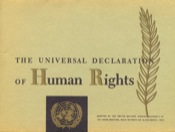Today is International Human Rights Day

On 10 December 1947, the UN General Assembly (resolution 217 A (III) (pdf)) adopted and proclaimed the Universal Declaration of Human Rights after a long drafting process. Since 1950, by way of commemoration of that event, that date has been International Human Rights Day. That makes today the sixtieth anniversary of the UDHR, and the day upon which the UN begins a year-long commemoration of the Declaration, with events planned throughout the year. The UDHR is now available in over 360 languages including Irish, making it the most translated document in the world. According to the UN’s Human Rights Day website:
…Th[e] theme for 2008, “Dignity and justice for all of us,â€? reinforces the vision of the Universal Declaration of Human Rights (UDHR) as a commitment to universal dignity and justice. It is not a luxury or a wish-list.


 On the day when the teacher convicted of
On the day when the teacher convicted of  According to
According to 

